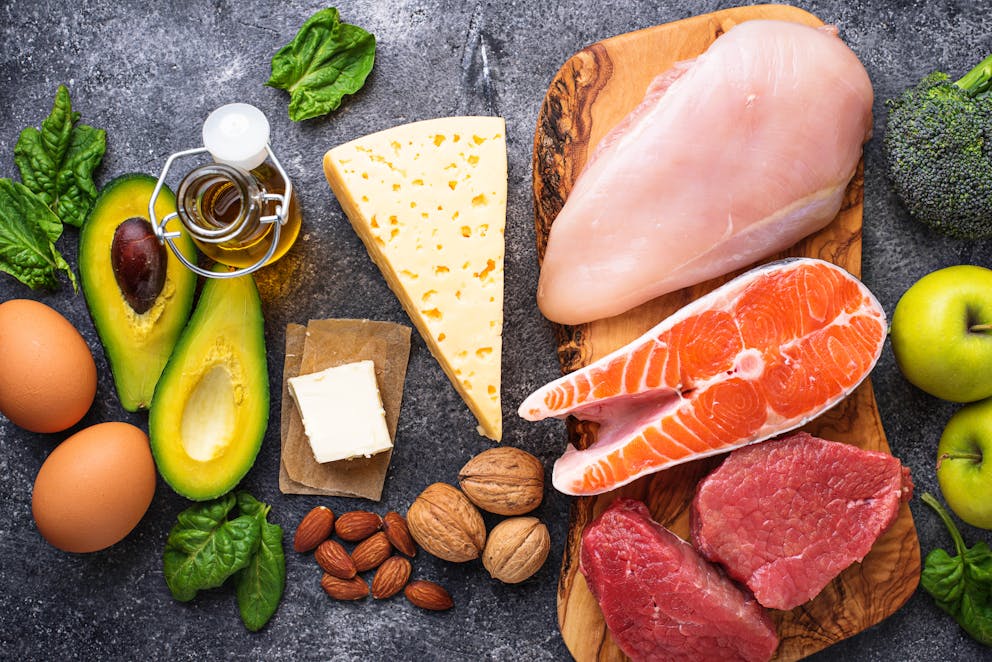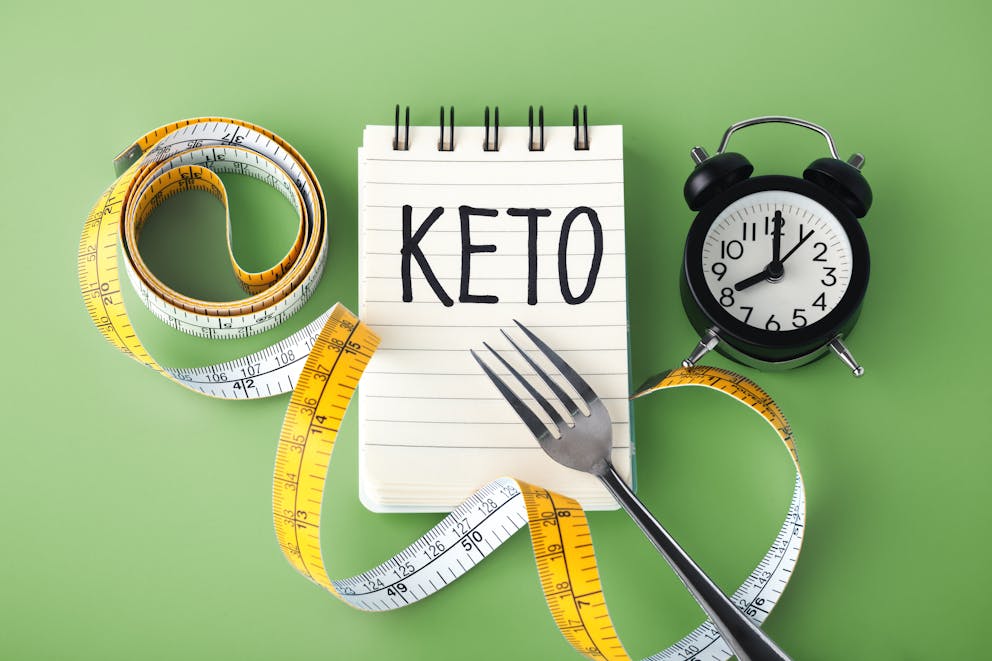Weight Watchers vs. Keto for Weight Loss & Health

Keto vs. Non-Keto
Quickly compare keto-friendly foods with non-keto options for easy reference
Use this wallet card to make informed food choices while shopping or dining out
Identify fake keto foods and ingredients that you should avoid
Simplify decision-making with clear, practical guidelines

Keto vs. Non-Keto
Quickly compare keto-friendly foods with non-keto options for easy reference
Use this wallet card to make informed food choices while shopping or dining out
Identify fake keto foods and ingredients that you should avoid
Simplify decision-making with clear, practical guidelines

Keto vs. Non-Keto
Quickly compare keto-friendly foods with non-keto options for easy reference
Use this wallet card to make informed food choices while shopping or dining out
Identify fake keto foods and ingredients that you should avoid
Simplify decision-making with clear, practical guidelines

Keto vs. Non-Keto
Quickly compare keto-friendly foods with non-keto options for easy reference
Use this wallet card to make informed food choices while shopping or dining out
Identify fake keto foods and ingredients that you should avoid
Simplify decision-making with clear, practical guidelines

Keto vs. Non-Keto
Quickly compare keto-friendly foods with non-keto options for easy reference
Use this wallet card to make informed food choices while shopping or dining out
Identify fake keto foods and ingredients that you should avoid
Simplify decision-making with clear, practical guidelines

Keto vs. Non-Keto
Quickly compare keto-friendly foods with non-keto options for easy reference
Use this wallet card to make informed food choices while shopping or dining out
Identify fake keto foods and ingredients that you should avoid
Simplify decision-making with clear, practical guidelines

Keto vs. Non-Keto
Quickly compare keto-friendly foods with non-keto options for easy reference
Use this wallet card to make informed food choices while shopping or dining out
Identify fake keto foods and ingredients that you should avoid
Simplify decision-making with clear, practical guidelines

Keto vs. Non-Keto
Quickly compare keto-friendly foods with non-keto options for easy reference
Use this wallet card to make informed food choices while shopping or dining out
Identify fake keto foods and ingredients that you should avoid
Simplify decision-making with clear, practical guidelines

Keto vs. Non-Keto
Quickly compare keto-friendly foods with non-keto options for easy reference
Use this wallet card to make informed food choices while shopping or dining out
Identify fake keto foods and ingredients that you should avoid
Simplify decision-making with clear, practical guidelines

Keto vs. Non-Keto
Quickly compare keto-friendly foods with non-keto options for easy reference
Use this wallet card to make informed food choices while shopping or dining out
Identify fake keto foods and ingredients that you should avoid
Simplify decision-making with clear, practical guidelines

Keto vs. Non-Keto
Quickly compare keto-friendly foods with non-keto options for easy reference
Use this wallet card to make informed food choices while shopping or dining out
Identify fake keto foods and ingredients that you should avoid
Simplify decision-making with clear, practical guidelines

Keto vs. Non-Keto
Quickly compare keto-friendly foods with non-keto options for easy reference
Use this wallet card to make informed food choices while shopping or dining out
Identify fake keto foods and ingredients that you should avoid
Simplify decision-making with clear, practical guidelines

Keto vs. Non-Keto
Quickly compare keto-friendly foods with non-keto options for easy reference
Use this wallet card to make informed food choices while shopping or dining out
Identify fake keto foods and ingredients that you should avoid
Simplify decision-making with clear, practical guidelines

Beginner’s Guide to Healthy Keto & Intermittent Fasting
Receive a step-by-step guide to starting Healthy Keto® and intermittent fasting
Learn about foundational principles and best practices for beginners
Get detailed visual guidance on portion sizes and meal composition
Discover how to set achievable goals and monitor your progress
Find practical tips for overcoming common challenges and staying motivated

Beginner’s Guide to Healthy Keto & Intermittent Fasting
Receive a step-by-step guide to starting Healthy Keto® and intermittent fasting
Learn about foundational principles and best practices for beginners
Get detailed visual guidance on portion sizes and meal composition
Discover how to set achievable goals and monitor your progress
Find practical tips for overcoming common challenges and staying motivated

Beginner’s Guide to Healthy Keto & Intermittent Fasting
Receive a step-by-step guide to starting Healthy Keto® and intermittent fasting
Learn about foundational principles and best practices for beginners
Get detailed visual guidance on portion sizes and meal composition
Discover how to set achievable goals and monitor your progress
Find practical tips for overcoming common challenges and staying motivated

Beginner’s Guide to Healthy Keto & Intermittent Fasting
Receive a step-by-step guide to starting Healthy Keto® and intermittent fasting
Learn about foundational principles and best practices for beginners
Get detailed visual guidance on portion sizes and meal composition
Discover how to set achievable goals and monitor your progress
Find practical tips for overcoming common challenges and staying motivated

Beginner’s Guide to Healthy Keto & Intermittent Fasting
Receive a step-by-step guide to starting Healthy Keto® and intermittent fasting
Learn about foundational principles and best practices for beginners
Get detailed visual guidance on portion sizes and meal composition
Discover how to set achievable goals and monitor your progress
Find practical tips for overcoming common challenges and staying motivated

Beginner’s Guide to Healthy Keto & Intermittent Fasting
Receive a step-by-step guide to starting Healthy Keto® and intermittent fasting
Learn about foundational principles and best practices for beginners
Get detailed visual guidance on portion sizes and meal composition
Discover how to set achievable goals and monitor your progress
Find practical tips for overcoming common challenges and staying motivated

Beginner’s Guide to Healthy Keto & Intermittent Fasting
Receive a step-by-step guide to starting Healthy Keto® and intermittent fasting
Learn about foundational principles and best practices for beginners
Get detailed visual guidance on portion sizes and meal composition
Discover how to set achievable goals and monitor your progress
Find practical tips for overcoming common challenges and staying motivated

Beginner’s Guide to Healthy Keto & Intermittent Fasting
Receive a step-by-step guide to starting Healthy Keto® and intermittent fasting
Learn about foundational principles and best practices for beginners
Get detailed visual guidance on portion sizes and meal composition
Discover how to set achievable goals and monitor your progress
Find practical tips for overcoming common challenges and staying motivated

Beginner’s Guide to Healthy Keto & Intermittent Fasting
Receive a step-by-step guide to starting Healthy Keto® and intermittent fasting
Learn about foundational principles and best practices for beginners
Get detailed visual guidance on portion sizes and meal composition
Discover how to set achievable goals and monitor your progress
Find practical tips for overcoming common challenges and staying motivated

Beginner’s Guide to Healthy Keto & Intermittent Fasting
Receive a step-by-step guide to starting Healthy Keto® and intermittent fasting
Learn about foundational principles and best practices for beginners
Get detailed visual guidance on portion sizes and meal composition
Discover how to set achievable goals and monitor your progress
Find practical tips for overcoming common challenges and staying motivated

Beginner’s Guide to Healthy Keto & Intermittent Fasting
Receive a step-by-step guide to starting Healthy Keto® and intermittent fasting
Learn about foundational principles and best practices for beginners
Get detailed visual guidance on portion sizes and meal composition
Discover how to set achievable goals and monitor your progress
Find practical tips for overcoming common challenges and staying motivated

Beginner’s Guide to Healthy Keto & Intermittent Fasting
Receive a step-by-step guide to starting Healthy Keto® and intermittent fasting
Learn about foundational principles and best practices for beginners
Get detailed visual guidance on portion sizes and meal composition
Discover how to set achievable goals and monitor your progress
Find practical tips for overcoming common challenges and staying motivated

Beginner’s Guide to Healthy Keto & Intermittent Fasting
Receive a step-by-step guide to starting Healthy Keto® and intermittent fasting
Learn about foundational principles and best practices for beginners
Get detailed visual guidance on portion sizes and meal composition
Discover how to set achievable goals and monitor your progress
Find practical tips for overcoming common challenges and staying motivated
Weight Watchers is a commercial diet program based on a point system encouraging participants to eat fewer calories.
In contrast, the ketogenic diet is a low-carb, high-fat diet that pushes your metabolism to burn fat instead of carbs for energy. If done correctly, keto doesn’t just help to achieve your weight goals but also promotes a healthy body.
Learn why restricting carbs is the best way to lose weight and how to get started with Healthy Keto®.
![]()
Weight Watchers and keto compared
Weight Watchers and the keto diet are both popular weight loss programs that have helped a large number of people to shed weight.
However, they are based on fundamentally different metabolic approaches, which explains why long-term weight loss success differs between these two diets.
Let’s take a look at the key differences between Weight Watchers and keto.
What is Weight Watchers?
The Weight Watchers diet is a diet plan created by Weight Watchers International. It uses a points system, where each food and drink is assigned a point value based on its calorie, fat, and sugar content.
Weight Watcher participants are given a daily points allowance based on their age, gender, weight, and activity level, and they can use these points to create a daily meal plan.
Low-calorie foods generally have a lower point value than high-calorie foods such as soda, candy, or donuts, encouraging calorie restriction to achieve weight loss.
Interestingly, no food is off limits on the Weight Watchers weight loss program. While it may sound appealing that you can eat all your favorite foods while trying to lose weight, it’s also Weight Watchers' major drawback.
Weight Watchers point-based diet approach is similar to calorie counting and only focuses on caloric restriction and portion control instead of motivating healthy food choices.
It’s also important to note that Weight Watchers is a subscription model that requires a monthly fee to access individualized recommendations, recipes, and other resources.

What is keto?
Keto is a low-carb, high-fat, and moderate-protein diet that primes your metabolism to burn fat instead of carbs for energy.
As your liver breaks down fat, it produces large quantities of ketones, a highly efficient energy source. When ketones enter your circulation, and your cells utilize them as a fuel source, your body enters ketosis.
Eating carbohydrates raises your blood sugar which triggers the release of insulin, a critical player in controlling how your metabolism produces energy. Insulin blocks your liver from converting fats to energy and shifts your metabolism into a fat-storing mode which leads to weight gain.
Most keto diets focus on consuming no more than 20 to 50 grams of net carbs daily to maintain ketosis. A low-carb diet keeps insulin low and promotes fat burning, explaining why keto is one of the most successful weight loss diets.
The longer you stay in ketosis, the more efficient your metabolism will become at burning fat which is incredibly effective for losing weight.
Critics often point out that keto can lead to nutrient deficiencies due to excluding grains, fruits, and some vegetables. That’s why it's essential to do a Healthy Keto diet that focuses on nutrient-rich, low-carb foods to provide all nutritional needs while burning fat.
Watch the video below to find out why keto is the best choice for successful weight management.
Which is better for weight loss, keto or Weight Watchers?
Doing a keto diet isn’t just better for weight loss than Weight Watchers, but it also supports your health and helps to maintain a healthy weight in the long run.
Weight loss from the Weight Watchers diet typically results from calorie restriction and portion control, not because participants chose to opt for healthier foods.
In addition, the Weight Watchers diet plan suggests consuming between 45 to 60 percent of daily calories in the form of carbs.
A high carb intake will raise blood sugar levels and trigger insulin to spike, blocking your metabolism from burning stored body fat, which can slow down or prevent weight loss.
Keto keeps your metabolism in a fat-burning state and helps you shed weight fast. And, what’s more, the hormonal changes due to ketosis support your metabolic health and lower the risk of heart disease, diabetes, and insulin resistance.
A study published in Experimental and Clinical Cardiology states, “A long-term ketogenic diet significantly reduced the body weight and body mass index of obese patients. Furthermore, it decreased triglycerides, LDL cholesterol, and blood glucose levels.”

Benefits of Weight Watchers
The Weight Watchers diet has helped many people with short-term weight loss.
The program also encourages a healthy lifestyle, including physical activity, and has created a convenient online platform that members can use to track their food points, access recipes, and log how much weight they have lost.
Because of their subscription model, Weight Watchers offer participants access to a supportive community of people trying to lose weight. This can be helpful for individuals that struggle with motivation or feel isolated.
Weight Watchers created various food products, including snacks, frozen meals, and even desserts, that fit within their points system. However, these products are often highly processed foods that contain artificial ingredients and, surprisingly, sugars and high-fructose corn syrup.

Benefits of Healthy Keto
Healthy Keto is a nutritious high-fat diet emphasizing the importance of consuming healthy fats, organic produce, and high-quality meats.
Limiting carbs to maintain fat-burning and eating plenty of nutrient-rich foods has many health benefits, including:
Weight loss
Improved energy
Better moods
Lower risk of diabetes and metabolic syndrome
Compared to the Weight Watchers plan, keto doesn’t restrict portions or count calories. There is a wide range of nutritious, low-carb food options, making Healthy Keto a flexible and versatile diet that promotes optimal nutrition and health.
Keto is one of the few weight-loss diets that won’t leave you hungry. In fact, research published in the European Journal of Clinical Nutrition found that dieters on the ketogenic diet lost significant amounts of weight without developing cravings or hunger, making keto a viable and sustainable long-term dietary approach.
“Combining keto with intermittent fasting amplifies the metabolic effects of ketosis,” explains Dr. Berg. “This will support balanced blood sugar control and accelerate weight loss.”
Intermittent fasting (IF) is a mealtime schedule that alternates between periods of fasting and eating. IF enhances the effects of ketosis by increasing the length of time the body is in a fasted state, which promotes the production of ketones and speeds up fat burning.
Doing keto and IF doesn’t just benefit weight loss. Eating fewer meals saves time and money and has been found to lower inflammation and trigger cellular repair processes, also known as autophagy.

How to start Healthy Keto and Intermittent Fasting
Depending on your previous diet, limiting carbs may seem challenging. However, starting keto is easy, and there are a few steps that you can take that help you transition smoothly into keto and intermittent fasting.
Educate yourself about keto basics
Understanding what foods are high in carbs and how to calculate your daily net carb count are valuable tools to enter and maintain ketosis.
Do Healthy Keto
Without a focus on healthy foods, a keto diet can be high in processed foods full of harmful trans fats and preservatives.
Healthy Keto incorporates grass-fed beef, wild-caught fish and game meat, organic vegetables, and full-fat organic dairy to provide optimal nutrition while keeping your metabolism in fat-burning mode.
Stock up on keto-friendly foods
It’s essential to have a variety of keto-friendly options on the Keto Food List to choose from.
You may experience some carb withdrawal during the early stages of adapting to the profound metabolic changes of keto, and having keto-friendly foods readily available helps to curb cravings.
Slowly introduce intermittent fasting
Starting keto and IF simultaneously can be overwhelming and trigger keto-flu symptoms, including headaches, fatigue, and muscle cramps.
If you are new to intermittent fasting, slowly extend fasting periods and let your body adjust to longer periods without eating. The 16:8 intermittent fast—16 hours of fasting followed by an eight-hour eating period—works perfectly with a ketogenic diet and profoundly benefits metabolic health.

Key takeaways
Weight Watchers is a commercial weight loss program emphasizing portion control and calorie restriction.
While many people have lost weight with this diet, the Weight Watchers plan doesn’t focus on healthy eating and encourages foods that cause blood sugar imbalances and weight gain.
In contrast, Healthy Keto is a low-carb diet that combines the metabolic effects of ketosis with optimal nutrition.
Not only does keto help to significantly reduce weight, but it also supports a healthy body. Ketosis curbs hunger and cravings, making the ketogenic diet an effective long-term weight-loss diet that keeps you satiated.
FAQ
1. Which is more effective, Weight Watchers or keto?
Keto is a more effective weight-loss diet than Weight Watchers. Ketosis triggers the conversion of fat into energy which promotes weight loss and helps weight maintenance.
In contrast, Weight Watchers focuses only on calorie restriction and portion control, which isn’t sustainable and the main reason people abandon their weight loss plan.
2. Can you do keto with Weight Watchers?
Combining keto with Weight Watchers isn’t practical. Weight Watchers recommends many high-carb foods and limits healthy fats, which can quickly push you out of ketosis.
3. Is Weight Watchers good for a low-carb lifestyle?
No, the Weight Watchers plan is high in carbs and unsuitable for a low-carb lifestyle.
The Weight Watchers diet plan suggests consuming between 45 to 60 percent of daily calories in the form of carbs, which will raise insulin levels and block your metabolism from converting fat into energy.
4. Which is better for your health, keto or Weight Watchers?
Weight Watchers encourages weight loss through portion control and has little emphasis on the nutritional value of foods consumed.
In contrast, Healthy Keto combines the metabolic benefits of ketosis with nutrient-rich foods that support optimal nutrition and promote a healthy body.
5. What are the downfalls of a keto diet?
Only considering the carb and fat content of foods can quickly lead to a dirty keto diet high in processed foods and harmful preservatives. Dirty keto can cause nutrient deficiencies, gastrointestinal issues, and inflammation.
That’s why it’s essential to do a Healthy Keto diet focusing on grass-fed beef, wild-caught fish and game meat, organic vegetables, and full-fat organic dairy.
6. How many carbs does Weight Watchers allow per day?
Weight Watchers recommends that between 45 to 60 percent of daily calories should come from carbs. That’s as much as 300 grams of carbs based on a daily intake of 2000 calories.
7. Is there a low-carb version of Weight Watchers?
Weight Watchers has developed some low-carb recipes. However, it’s important to note that Weight Watchers doesn’t specifically focus on low-carb foods and instead emphasizes portion control and calorie restriction.
8. What are the benefits of keto over Weight Watchers?
Compared to Weight Watchers, Healthy Keto is a more effective and sustainable weight loss diet. Ketosis has profound benefits for metabolic health and long-term weight management.
In addition, Healthy Keto incorporates nutrient-rich foods that support optimal nutrition while converting fat into energy.
9. Can I do keto if I don’t need to lose weight?
Yes, you can do keto even if you don't need to lose weight.
The keto diet has several health benefits beyond weight loss, including improving insulin sensitivity, reducing inflammation, and lowering the risk of diabetes and heart disease.
10. Do low-calorie diets really work?
Low-calorie diets can cause some weight loss. However, restricting calories is often not sustainable in the long term due to hunger and cravings. Stopping a low-calorie diet can result in weight gain due to a slower metabolism triggered by caloric restriction.
11. What if I need more guidance for starting keto?
Starting keto is easy, and there are many in-depth guides and resources online that help you transition into the keto and intermittent fasting lifestyle.
Previous blog
The Number 1 Best Rated Diet of 2018Next blog
Why Organic Meats on KetoTags

Popular
08/21/2024
55.7K views
02/23/2025
46.8K views
11/18/2024
281.2K views
03/18/2024
11/21/2022




